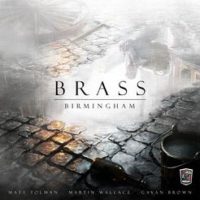
Brass: Birmingham
2-4
14+
60+
A finely brewed sequel to the original featuring new industries, new mechanics, and new strategies for you to discover.
~ Birmingham Features ~ Dynamic board setup makes each game unfold completely differentlyCore rules stay true to the original
New canal/rail scoring creates tactics in where you place them
3 new industry types include Breweries, Potteries and Manufactured goods
New actions, mechanics and strategies to discover Each game includes 78 Iron Clays in the following denomination:
40 X 1s
18 X 5s
10 X 10s
10 X 20s
User Reviews (1)
Add a Review for "Brass: Birmingham"
You must be logged in to add a review.

With a few slight changes, Brass Birmingham adds to an already great classic.
Gameplay/replay
Brass Birmingham is played over 2 eras, the canal era, where each player may only build one building per city, and the rail era, where those shackles come off and the more expensive rails start replacing canals to link shipping between cities. Each round, players take 2 actions by playing the cards they have. These actions include
Build: Discard a card with the city you are building in, or the building type that matches a building symbol in a city you are connected to
Ship: discard a card and flip a manufacture, textile, or pottery by paying the shipping cost in available beer
Take wild cards: discard 3 cards (one to take your action, 2 to be replaced) and take a wild city and wild building card, you my never have more than one of each in hand
Build rail/canal: discard a card and pay the cost for a canal (3 money) or rail (5 money and a coal for one, 15 money, 2 coal and a beer for 2)
Take a loan: discard a card, take 30 money, move your income marker back 3 full units
Develop: discard a card and remove up to 2 tiles on your building mat to access more advanced buildings
When your turn ends draw 2 more cards (if available)
When a round ends you either take income or pay debt, when you have no cards left the era ends that round.
When the era ends you score flipped buildings (shipped or fully emptied goods buildings) and connection points per rail or canal you built. The game ends after the rail era scoring is done
The Bad
This is an overwhelming game when you first learn it. Once it clicks you realize it isn’t that complex rules wise (turns are always discard a card and take an action) but for novice hobby boardgamers this always seems to overwhelm them initially
In Conclusion
I highly recommend you learn this one, it is one of the best board games ever created